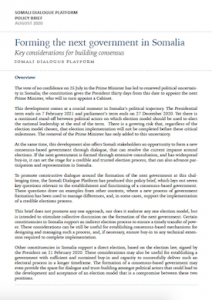The vote of no confidence on 25 July in the Prime Minister has led to renewed political uncertainty in Somalia; the constitution gives the President thirty days from this date to appoint the next Prime Minister, who will in turn appoint a Cabinet.
This development comes at a crucial moment in Somalia’s political trajectory. The Presidential term ends on 7 February 2021 and parliament’s term ends on 27 December 2020. Yet there is a continued stand-off between political actors on which election model should be used to elect the national leadership at the end of the term. There is a growing risk that, regardless of the election model chosen, that election implementation will not be completed before these critical milestones. The removal of the Prime Minister has only added to this uncertainty.
At the same time, this development also offers Somali stakeholders an opportunity to form a new consensus-based government through dialogue, that can resolve the current impasse around elections. If the next government is formed through extensive consultation, and has widespread buy-in, it can set the stage for a credible and trusted election process, that can also advance participation and representation in Somalia.
To promote constructive dialogue around the formation of the next government at this challenging time, the Somali Dialogue Platform has produced this policy brief, which lays out seven key questions relevant to the establishment and functioning of a consensus-based government. These questions draw on examples from other contexts, where a new process of government formation has been used to manage differences, and, in some cases, support the implementation of a credible elections process.




